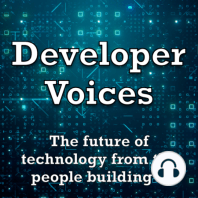62 min listen
Unison: A Programming Language for Distributed Computing
FromDeveloper Voices
ratings:
Length:
62 minutes
Released:
Jul 19, 2023
Format:
Podcast episode
Description
“Software development has not caught up with the internet age.” So says this week’s guest, Rúnar Bjarnason. But what does that mean? What would a programming language for the internet age look like?Rúnar’s answer is Unison. A language that completely rethinks the way distributing computing can work, from the source code up. Borrowing some key ideas from git, it challenges the way we think about code-sharing, compilation, versioning and more. --Kris on Twitter: https://twitter.com/krisajenkinsKris on LinkedIn: https://www.linkedin.com/in/krisjenkins/Rúnar on Twitter: https://twitter.com/runaroramaRúnar’s book, Function Programming in Scala: https://amzn.to/46I9jewUnison website: https://unison-lang.orgComplete and Easy Bidirectional Typechecking for Higher-Rank Polymorphism (pdf): https://www.cl.cam.ac.uk/~nk480/bidir.pdfDo Be Do Be Do (pdf): https://arxiv.org/pdf/1611.09259.pdfRúnar’s Øredev conference talk: https://youtu.be/EgIVzOobD48Cloud icons created by Freepik - Flaticon: https://www.flaticon.com/free-icons/cloudComputer icons created by xnimrodx - Flaticon: https://www.flaticon.com/free-icons/computer
Released:
Jul 19, 2023
Format:
Podcast episode
Titles in the series (48)
Can Kotlin take you everywhere? by Developer Voices
